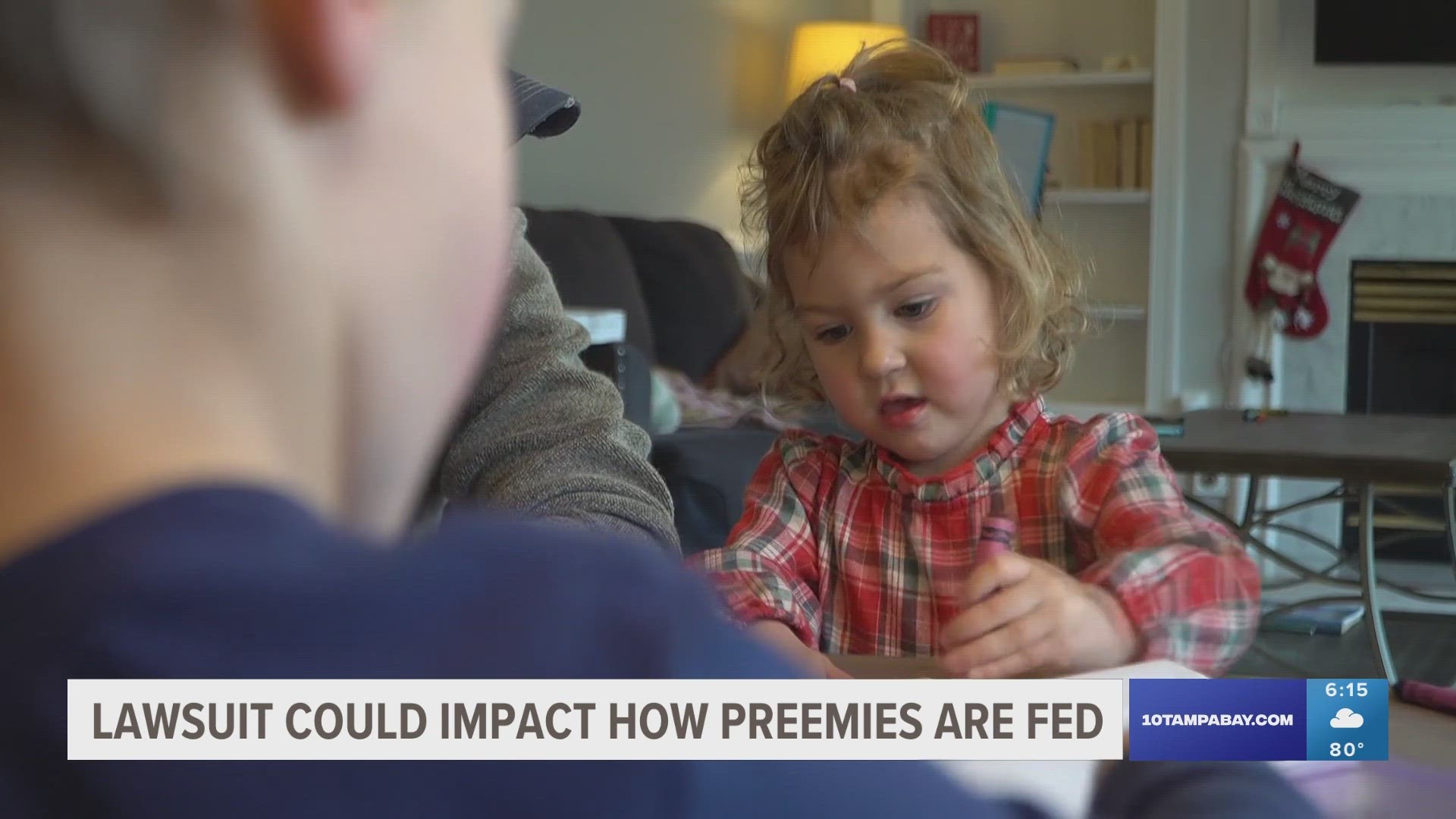TAMPA, Fla. — A jury in Missouri recently reached a verdict in a landmark case that could change the way preemies are fed in NICUs nationwide.
The jury found formula manufacturing giant Mead Johnson liable and awarded the plaintiffs $60 Million. The company is accused of not doing enough to warn parents about the increased risk of a deadly disease called necrotizing enterocolitis or NEC in premature babies who are fed the formula.
“They were born by c-section at 32 weeks,” Heather Holley said, reflecting on what was supposed to be one of her family’s most exciting moments — welcoming their twin daughters River and Willow into the world. It quickly turned to darkness. Willow’s intestinal system was shutting down, so both the twins were in neonatal intensive care.
“We wanted them fed with exclusive breastfed,” Holley said.
But instead, the new parents were told mom’s breast milk was going to be supplemented with baby formula.
“They explained that to us that would add extra calories to our breast milk during feedings,” Holley said. “We should’ve asked more questions.”
Baby Willow was diagnosed with necrotizing enterocolitis also known as NEC for short.
Ravi Patel is a professor of pediatrics at Emory University and Children's Health Care Atlanta.
“It’s a lethal disease. One baby dies of NEC every day. We do know one of the best ways to prevent NEC is providing breast milk to premature babies,” Patel said.
It’s something Matt and Susan Lea say they never had heard about when their baby was in the NICU.
“I had no idea what it was,” Matt Lea said.
Doctors had to do an emergency surgery on their daughter Sophia and put a drain in.
“There was a 70 percent chance she would not make it is what we were told,” Susan Lea said.
Both sets of parents say they were left in the dark about the dangers that could arise if their premature babies were given formula made with cow’s milk.
10 Investigates uncovered study after study alerting to the potential dangers. In 2011, a surgeon general report stated that premature babies who are not breastfed are 138% more likely to develop NEC.
Now, both families plus hundreds more are suing formula giants Abbott and Mead Johnson — the manufacturers of Similac and Enfamil. Attorney Steve Reck filed the first lawsuit three years ago. He has thousands of clients across the country.
“The science is going to be tested,” Reck said.
The first case to come before a judge was in St. Clair County, Missouri. It ended in a $60 Million victory for the plaintiffs against Mead Johnson. That’s $35 million more than the plaintiffs’ attorneys were asking. It wasn’t Reck’s case, but he watched the entire thing as he believes this will determine how future cases will play out in court.
“The feeding is done and the mothers are never told that this product could cause NEC,” Reck said.
That’s what these parents would like to see change. Baby Sophia is developmentally delayed. Matt and Susan Lea believe it’s because of how long she was deprived of nutrition due to her battle against NEC.
And for Willow Holley’s twin, River, she only has photos to remember her sister.
Mead Johnson sent this statement after the jury verdict saying in part:
"Mead Johnson products provide lifesaving nutrition options to health care professionals caring for premature infants so we are, of course, surprised and deeply disappointed with the verdict. While we continue to offer our deepest condolences to Ms. Watson, we strongly disagree with the jury’s decision to fault Mead Johnson and award damages. We continue to believe that the allegations from the plaintiff’s lawyers in this case were not supported by the science or experts in the medical community. We are considering all of our options, including appeal."
And while Abbott was not mentioned in the Missouri court case, they did send us this statement:
“Abbott has spent decades researching, developing, testing and producing formulas and fortifiers for premature infants, and countless infants have benefitted tremendously from these products. These allegations are without merit, advancing a theory promoted by plaintiffs’ lawyers rather than the medical community, which considers these products part of the standard of care for premature infants.”
10 Investigates asked several hospitals in the Tampa Bay area about breast milk in the NICU. A spokesperson for Sarasota Memorial Hospital tells 10 Investigates:
“We do still have the milk depots at both SMH campuses, and this milk can be critically important for premature babies in NICUs throughout the state. The donating mothers are screened before they donate, and the milk is screened and pasteurized as well. That’s all coordinated by Mothers Milk Bank of Florida.”
A spokesperson for BayCare tells 10 Investigates:
“BayCare’s Donor Breastmilk Program at St. Joseph’s Women’s Hospital was created in 2013. It fills the nutritional gap that may be experienced during a baby’s time in the NICU to ensure the infant continues to receive breastmilk feedings. Infants weighing less than 3.75 pounds are eligible for donor breastmilk when their mother’s supply does not meet the baby’s nutritional needs. To donate breast milk, a woman must meet strict requirements including: good overall health, not taking regular medication, have a baby that is healthy and doing well, non-smoker, home freezer reaches appropriate temperature, undergo a blood test.”
If you’re interested in donating breast milk, Mothers’ Milk Bank of Florida has donation locations throughout the state.

